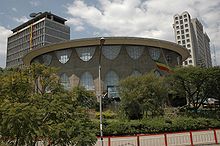In spite of fast growth in recent years, GDP per capita is one of the lowest in the world, and the economy faces a number of serious structural problems. Agricultural productivity remains low, and frequent droughts still beset the country. Ethiopia is often ironically referred to as the "water tower" of Eastern Africa because of the many (14 major) rivers that pour off the high tableland, including the Nile. It also has the greatest water reserves in Africa, but few irrigation systems in place to use it. Just 1% is used for power production and 1.5% for irrigation.
| Religion in Ethiopia | ||||
|---|---|---|---|---|
| Religion | Percent | |||
| Christianity | 62.8% | |||
| Islam | 33.9% | |||
| African traditional religions | 2.6% | |||
| Others | 0.6% | |||
Ethiopia has close historical ties with all three of the world's major Abrahamic religions. In the 4th century, the region was one of the first in the world to officially adopt Christianity as the state religion. While no longer distinguished as a state religion, it remains the majority faith. There is also a substantial Muslim demographic, representing about a third of the population. Ethiopia is also the site of the first Hijra in Islamic history. A town in the Tigray Region, Negash is the oldest Muslim settlement in Africa. Until the 1980s, a substantial population of Ethiopian Jews resided in Ethiopia.














